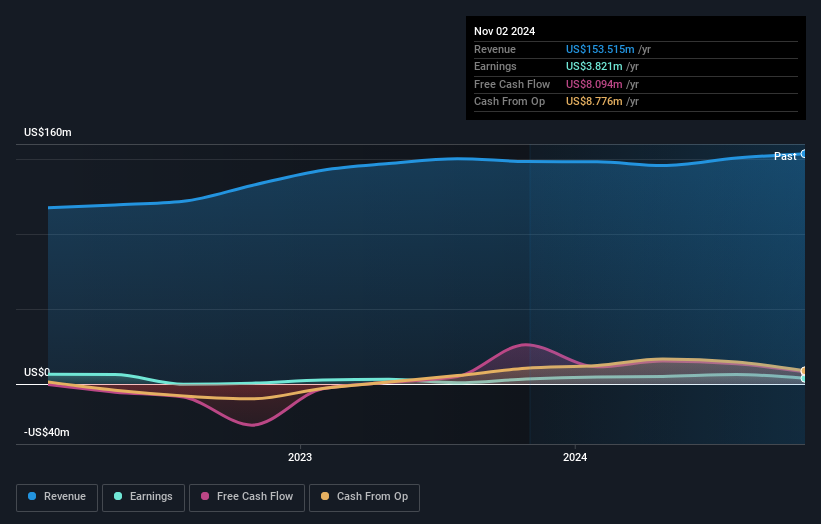- United States
- /
- Tech Hardware
- /
- NasdaqGM:ALOT
AstroNova, Inc.'s (NASDAQ:ALOT) market cap dropped US$13m last week; individual investors who hold 44% were hit as were institutions

Key Insights
- Significant control over AstroNova by individual investors implies that the general public has more power to influence management and governance-related decisions
- A total of 17 investors have a majority stake in the company with 51% ownership
- 37% of AstroNova is held by Institutions
Every investor in AstroNova, Inc. (NASDAQ:ALOT) should be aware of the most powerful shareholder groups. The group holding the most number of shares in the company, around 44% to be precise, is individual investors. In other words, the group stands to gain the most (or lose the most) from their investment into the company.
Following a 11% decrease in the stock price last week, individual investors suffered the most losses, but institutions who own 37% stock also took a hit.
In the chart below, we zoom in on the different ownership groups of AstroNova.
Check out our latest analysis for AstroNova

What Does The Institutional Ownership Tell Us About AstroNova?
Many institutions measure their performance against an index that approximates the local market. So they usually pay more attention to companies that are included in major indices.
As you can see, institutional investors have a fair amount of stake in AstroNova. This implies the analysts working for those institutions have looked at the stock and they like it. But just like anyone else, they could be wrong. It is not uncommon to see a big share price drop if two large institutional investors try to sell out of a stock at the same time. So it is worth checking the past earnings trajectory of AstroNova, (below). Of course, keep in mind that there are other factors to consider, too.

It looks like hedge funds own 13% of AstroNova shares. That catches my attention because hedge funds sometimes try to influence management, or bring about changes that will create near term value for shareholders. Looking at our data, we can see that the largest shareholder is Juniper Investment Company, LLC with 7.1% of shares outstanding. Meanwhile, the second and third largest shareholders, hold 6.8% and 6.5%, of the shares outstanding, respectively. In addition, we found that Gregory Woods, the CEO has 2.5% of the shares allocated to their name.
After doing some more digging, we found that the top 17 have the combined ownership of 51% in the company, suggesting that no single shareholder has significant control over the company.
While it makes sense to study institutional ownership data for a company, it also makes sense to study analyst sentiments to know which way the wind is blowing. As far as we can tell there isn't analyst coverage of the company, so it is probably flying under the radar.
Insider Ownership Of AstroNova
The definition of an insider can differ slightly between different countries, but members of the board of directors always count. Management ultimately answers to the board. However, it is not uncommon for managers to be executive board members, especially if they are a founder or the CEO.
Insider ownership is positive when it signals leadership are thinking like the true owners of the company. However, high insider ownership can also give immense power to a small group within the company. This can be negative in some circumstances.
We can see that insiders own shares in AstroNova, Inc.. It has a market capitalization of just US$113m, and insiders have US$7.6m worth of shares, in their own names. It is good to see some investment by insiders, but we usually like to see higher insider holdings. It might be worth checking if those insiders have been buying.
General Public Ownership
The general public, who are usually individual investors, hold a 44% stake in AstroNova. While this group can't necessarily call the shots, it can certainly have a real influence on how the company is run.
Next Steps:
It's always worth thinking about the different groups who own shares in a company. But to understand AstroNova better, we need to consider many other factors. Like risks, for instance. Every company has them, and we've spotted 2 warning signs for AstroNova (of which 1 doesn't sit too well with us!) you should know about.
If you would prefer check out another company -- one with potentially superior financials -- then do not miss this free list of interesting companies, backed by strong financial data.
NB: Figures in this article are calculated using data from the last twelve months, which refer to the 12-month period ending on the last date of the month the financial statement is dated. This may not be consistent with full year annual report figures.
New: Manage All Your Stock Portfolios in One Place
We've created the ultimate portfolio companion for stock investors, and it's free.
• Connect an unlimited number of Portfolios and see your total in one currency
• Be alerted to new Warning Signs or Risks via email or mobile
• Track the Fair Value of your stocks
Have feedback on this article? Concerned about the content? Get in touch with us directly. Alternatively, email editorial-team (at) simplywallst.com.
This article by Simply Wall St is general in nature. We provide commentary based on historical data and analyst forecasts only using an unbiased methodology and our articles are not intended to be financial advice. It does not constitute a recommendation to buy or sell any stock, and does not take account of your objectives, or your financial situation. We aim to bring you long-term focused analysis driven by fundamental data. Note that our analysis may not factor in the latest price-sensitive company announcements or qualitative material. Simply Wall St has no position in any stocks mentioned.
About NasdaqGM:ALOT
AstroNova
Designs, develops, manufactures, and distributes specialty printers, and data acquisition and analysis systems in the United States, Europe, Asia, Canada, Central and South America, and internationally.
Mediocre balance sheet low.

